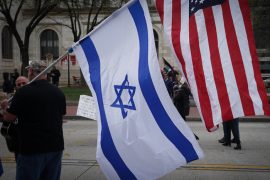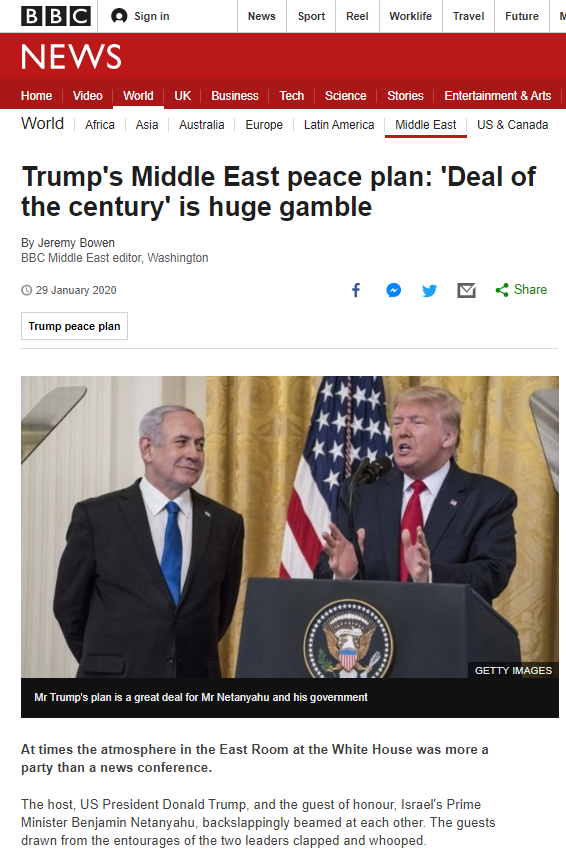Seth Freedman seemed to be proposing a unilateral Israeli withdrawal from Judea and Samaria in his July 6th CiF article on the basis of the argument that actions speak louder than words when it comes to making peace in the Middle East. Leaving aside Freedman’s fantastic interpretations of international law and his quoting of debatable reports from NGOs not noted for their comprehension of Israel’s basic security needs; just take a look at the way in which he describes a sector of his countrymen for whom he obviously has nothing but loathing and disdain.
“There is little point in expecting the settlers themselves to up and leave their cushy, state-subsidised homes as long as there is no official pressure on them to do so.”
As someone who has lived in what Freedman would doubtless call ‘the occupied Golan Heights’ for over a quarter of a century, I must admit that the ‘cushy, state-subsidised homes’ bit is news to me. It certainly didn’t feel very cushy during the many years in which I raised five children in 60 square meters of reinforced concrete designed to double up as an air-raid shelter when necessary, and there were definitely no subsidies to be had when we finally got round to extending.
“A dogged and dogmatic commitment to illegal settling of the West Bank is the nature of the settler beast”
Such a sweeping generalisation of thousands of people (who are in reality by no means the homogenous group Freedman would like to make out), coupled with their dehumanisation into a ‘beast’ should be profoundly worrying for anyone who cares about the future of Israeli society. Regardless of one’s opinions of settlements built upon territory reclaimed or taken in a defensive war and without connection to one’s opinion of what actually constitutes a settlement (Jerusalem? Gush Etzion?), it must be recognised that the people living in them today do so because their country permitted it and that it is plainly wrong to demonise them as individuals just because one does not see eye to eye with their politics or beliefs.
To me it is clear that if, one day, a negotiated peace agreement is ever signed with the Palestinians, some of the people who currently live in Judea & Samaria will have to evacuate their homes and abandon their livelihoods. They will uproot their children from school and even their dead from burial grounds as happened during the withdrawal from Gaza. If people such as Seth Freedman demonise and delegitimize these people with such apparent and public loathing, how are they to feel welcome when starting to try to build a new life inside Israel’s revised borders? How are they to fit into a society which relates to them as though they were criminals? There is no room for Freedman’s brand of baseless hatred in our society, and an understanding of that fact should transcend any political differences of opinion.
Of course the key word here, and one of which Freedman has obviously yet to learn the importance, is ‘negotiated’. We are not alone in the Middle East, and we have already learned the bitter lessons of what happens when we act as though we were. We withdrew from Lebanon in May 2000, only to find ourselves fighting yet another war there six years later. We withdrew from the Gaza Strip in August 2005 only to find terror following us into Southern Israel. Now Freedman would have us make the same mistake in Judea & Samaria.
“Instead, the onus is on the Israeli government to pull the rug from beneath the settlers’ feet, in order to demonstrate serious commitment to the peace process and to prove to the Palestinians that Israel is prepared to make painful concessions in the name of ending the conflict.”
Maybe Seth Freedman didn’t see what I saw during the 2005 disengagement from Gaza. I watched the most painful of concessions and sacrifices being made by people with the same ideologies as those he today demonises. I saw a nation which knowingly endangered the harmony of its own society in order to try to achieve peace. I looked on with awe and respect as the residents of Gush Katif put their beliefs and convictions in second place after their commitment to their country and the decisions of its government, even if they disagreed with them, and I was, and am, incredibly proud to be part of a nation which is comprised of such people.
But just as Freedman is trapped inside a mindset which renders him incapable of seeing the true nature of some of his fellow countrymen, he is apparently also unable to listen to some of his neighbours, even though they are trying to get their message over loud and clear. As much as he may believe that actions speak louder than words, there are some words to which Freedman s definitely needs to listen.
Leader and co-founder of Hamas Mahmoud Al Zahhar laid out his vision of the future of the Israeli/Palestinian conflict.
“We have liberated Gaza, but have we recognized Israel? Have we given up our lands occupied in 1948? We demand the liberation of the West Bank, and the establishment of a state in the West Bank and Gaza, with Jerusalem as its capital – but without recognizing [Israel]. This is the key – without recognizing the Israeli enemy on a single inch of land.
“This is our plan for this stage – to liberate the West Bank and Gaza, without recognizing Israel’s right to a single inch of land, and without giving up the Right of Return for a single Palestinian refugee.
[…]
“Our plan for this stage is to liberate any inch of Palestinian land, and to establish a state on it. Our ultimate plan is [to have] Palestine in its entirety. I say this loud and clear so that nobody will accuse me of employing political tactics. We will not recognize the Israeli enemy. “
“As for the issue of a referendum – [the Palestinian Authority] is ready to impose its position on people by force. Whoever wants to hold a referendum, and believes that he can get all of Palestine for the Palestinians, can hold a referendum, but [we] will not give up the platform of resistance, and the plan to liberate Palestine in its entirety. This is unequivocal.
[…]
“If we could liberate the Negev now, we would continue [our military activity], but our capabilities dictate that after we got rid of the Israeli presence in Gaza, we must finish off the remnants of that occupation, and move on to the West Bank.”
There’s nothing that Seth Freedman or others living within his ideological bubble could say that could convince Al Zahhar and his followers that Offakim, Yeruham, Be’er Sheva and indeed Tel Aviv and Yaffo are not ‘settlements’ of precisely the same nature as Kedumim or Ma’on. From their point of view, there is no difference whatsoever between Daniella Weiss and Seth Freedman. This is the real issue which needs to be addressed if peace really is ever to come to the region.
Political witch hunts like Freedman’s are not only useless in the elusive quest for peace, but ultimately can do far more damage to Israeli society than any settlement ever did.


